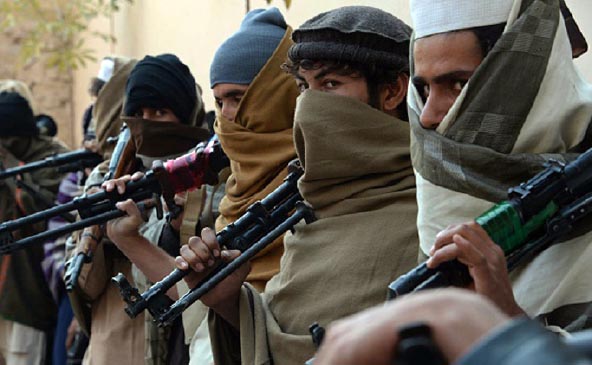The war on terror was ushered in following the 9/11 incident, to dismantle al-Qaeda and to deny it a safe base of operations in Afghanistan by removing the Taliban from power. The United Kingdom was the key ally of the United States, offering support for military action from the start of preparations for the invasion. In August 2003, NATO became involved as an alliance, taking the helm of the International Security Assistance Force (ISAF). With the increased attacks against militancy, the Taliban regime collapsed and insurgency lulled in the country. The guerilla fighters seemed to be on the verge of defeat – Afghan nation hoped to breathe a sigh of relief in a country free of violence and bloodshed.
The Constitution of Afghanistan was adopted based on democracy to build a civil society in which the rights and dignity of the individuals were protected. Freedom from want and fear was believed to be exercised by men and women across the country. The air was filled with a sense of hope and women could step out without chaperon. The presidential election on 2014 heralded democratic administrations, especially when a woman’s name, Masouda Jalal, was also on the list of the candidates – it was a great milestone in the history of Afghanistan. Moreover, the Constitution underlines the fundamental rights of men and women irrespective of their race, color and sex. In other words, the presidential and provincial elections were deemed as a “celebration of democracy” and a large number of men and women flocked to ballot boxes.
The public believed that the downfall of the Taliban’s regime would pave the ground for all democratic practices and the life and liberty of people would be held in great esteem. The war on terror which led to a lull in militancy filled the nation with confidence and women took high steps in social and political activities. Sadly, the nation’s dream did not come true as the Taliban guerillas reorganized and resumed militancy. Violence and bloodshed were restarted and curtailed the freedoms of men and women. Life turned cheap as it was during the Taliban’s regime and women lost their confidence to a great extent.
After 15 years of political wrestling and spending millions of dollars in Afghanistan, Barack Obama states that the situation in Afghanistan is still tough. However, he also believes that his administration had been instrumental in dismantling the Al Qaeda terrorist network. “We surged our efforts along with our allies in Afghanistan, which allowed us to focus on dismantling Al-Qaeda and give the Afghan government the opportunity to succeed. And this focus on Al-Qaeda, the most dangerous threat to the United States at the time, paid dividends,” he is cited as saying.
In fact, terrorism remains a serious threat to Afghan nation and the war on terror did not give the desired result. The graph of civilian casualties, caused by insurgency and terrorism, is high and the violation of human rights is practiced in every nook and cranny of the country. The Taliban have intensified their offensives, mainly with the establishment of the National Unity Government (NUG), under the leadership of Haibatullah Akhundaza. Democracy seems to be moribund as social, political and economic challenges increase. As a result of unmitigated insurgency, half a million Afghans have been, reportedly, displaced in the past ten months. According to UNAMA, 56 percent of those displaced are children and teenagers, 23 percent are men and 22 percent women. Furthermore, scores of Afghan youths migrated to foreign countries to escape the security crisis and economic stagnation. In a nutshell, brain drain is a highly critical issue and an irreparable loss for the state and nation.
After all, the militancy has been compounded with the emergence of the self-proclaimed Islamic State of Iraq and the Levant (ISIL). Currently, it is not only the Taliban fighters who pose threat to Afghanistan but also many warring factions, mainly the ISIL group. According to the public belief, the loyalists to the ISIL spilled the blood of members of ethnic minority groups on the basis of their racial and religious backgrounds and sought to stoke sectarian violence in Afghanistan.
The US President-elect Donald Trump has given few details of his foreign policy plans, with surprisingly few specifics on Afghanistan, where nearly 10,000 US troops remain more than 15 years after the Taliban were toppled by US-backed forces. In fact, Afghanistan was barely mentioned during a bitterly fought election campaign, which largely focused on domestic issues, between Republican Trump and his Democratic rival, former secretary of state Hillary Clinton.
Ghani and Trump spoke by telephone last week and the Trump transition team said in a statement they discussed the “terrorism threats facing both countries”. Moreover, speaking with reporters at Bagram airbase north of Kabul later on Friday, General John Nicholson, the commander of US and international forces in Afghanistan, said it was important for the United States to remain committed in Afghanistan.
Trump will inherit a challenging security situation in Afghanistan. A number of provincial capitals have been under pressure from the Taliban while Afghan forces have been suffering high casualty rates, with more than 5,500 killed in the first eight months of this year. In the meantime, US officials, including US Defence Secretary Ash Carter who paid an unannounced visit to Kabul, and General John Nicholson, declared the US’s commitment to Afghanistan. The war on terror is still to come to fruition.
Home » Opinion » The Fruition and Futility of Political Wrestling
The Fruition and Futility of Political Wrestling
| Hujjatullah Zia

